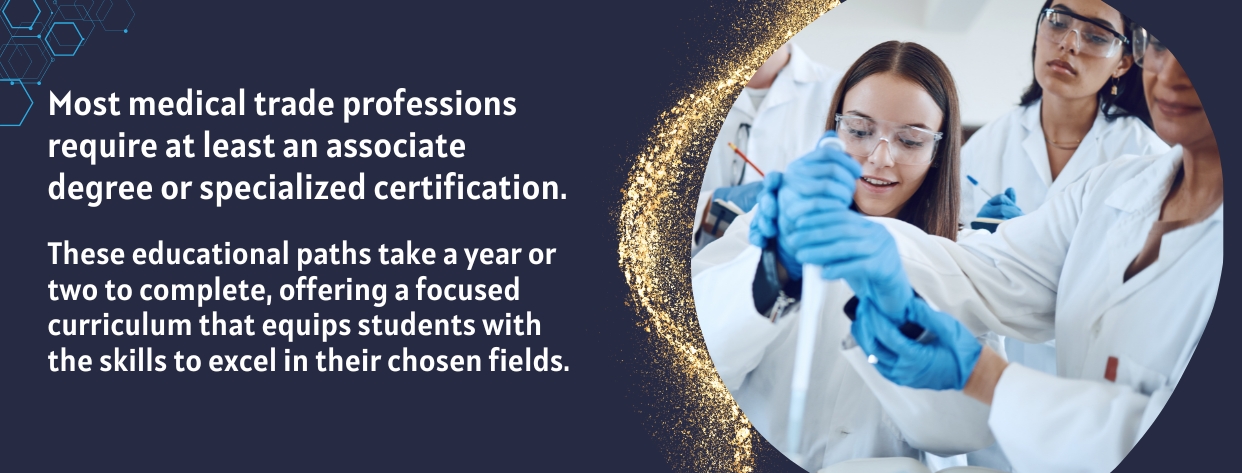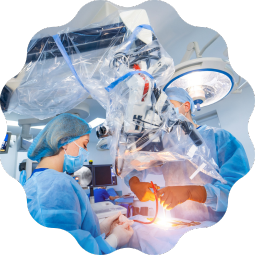Embarking on a journey in the vast world of health care, a medical trade career is considered the backbone of the industry. These healthcare professionals ensure the overall functionality, well-being of patients, and the smooth operation of the facilities.
Among these roles are individuals who play pivotal roles in areas such as diagnostics, patient care, technology, and administration. Pursuing a medical trade career isn’t just a job option; it is a duty to improve lives, treat patients, and make an impact on the well-being of individuals.
Navigating Careers through Self-Exploration
Embarking on a medical trade career begins with self-exploration. Understand your interests, strengths, and preferences. Are you drawn to working with technology, diagnostics, patient care, or healthcare administration tasks?
By delving into your interests, strengths, and preferences, you can align your passions with the right career path, ensuring not only professional fulfillment but also contributing to the vital mission of health care.
This exploration involves investigating diverse medical trade professions, each offering unique challenges and opportunities. Whether your inclinations lead you toward becoming a physical therapist, medical laboratory technician, radiologic technologist, surgical technologist, cardiovascular technologist, or medical coder, understanding the distinct characteristics of these roles is paramount.
Diverse Opportunities in the Medical Trades

The realm of medical trades offers a myriad of exciting and impactful career paths. These roles, integral to the seamless functioning of the industry, cater to a wide range of interests and expertise. Here’s a glimpse into some of the captivating job opportunities within the medical trades and the essential roles they play:
Medical Laboratory Technician (MLT)
MLTs analyze patient samples – blood, urine, tissues – utilizing advanced laboratory equipment providing crucial data to physicians for accurate diagnoses. MLTs play a role in detecting diseases and monitoring treatment progress.
Dental Hygienist
Dental hygienists stand as the frontliners of oral health. They perform teeth cleanings, take X-rays, and educate patients on proper oral hygiene practices. On the other hand, dental assistants stand as the bridge between dentists and patients. A dental assistant prepares treatment rooms and sterilizes equipment, and even assists during procedures.
One thing’s for sure, both dental hygienists and assistants play a dynamic role in educating patients to maintain good oral health.
Physical Therapists
PTs are the masters of rehabilitation, a physical therapist aids patients regain movement in recovering from injuries.
Occupational Therapy Assistants
Occupational Therapy Assistants help individuals regain or enhance their ability to perform daily activities. An Occupational therapy assistant partners with occupational therapists, they assist with exercises to teach adaptive techniques.
Registered Nurses (RNs)
RNs coordinate patient care across diverse healthcare settings. From administering medications and treatments to offering emotional support, RNs are compassionate advocates for patients’ well-being.
Nurse Midwives
Nurse midwives combine nursing expertise with midwifery skills to provide comprehensive care to expectant mothers.
Vocational Nurses or Nurse Practitioners
Working under the guidance of registered nurses and physicians, vocational nurses or nurse practitioners administer medications, monitor patients’ health conditions, and provide essential comfort and support.
Respiratory Therapists
Respiratory therapists are experts who ensure that the crucial function of the lungs remains optimal.
Radiation Therapists
Radiation therapists execute treatments prescribed by radiation oncologists. Their precise administration of radioactive drugs plays a critical role in targeting and treating cancerous cells.
Ultrasound Technicians
Ultrasound techs use sound waves to develop mages of internal body structures.
Radiologic Technicians and MRI Technologists
Radiologic technicians and MRI techs, like cardiovascular technologists, operate imaging equipment to capture detailed images of the body’s internal structures.
Biomedical Engineers
Merging engineering and healthcare, biomedical engineers develop and maintain medical equipment and devices. Their innovations enhance patient care by ensuring the accuracy and safety of medical technology.
Medical Assistants
Bridging patient care and administrative tasks, medical assistants play a multifaceted role in the medical field. They perform clinical tasks like taking vital signs, assisting with minor procedures, and maintaining patient records.
From the artistry of dental hygiene to the precision of radiation therapy, the medical trades offer an array of exhilarating paths. Each role brings its unique blend of challenges and rewards, all in service of enhancing patient care and contributing to the intricacies of modern healthcare.
Education, Training, and Their Benefits

Once you’ve identified a suitable medical trade career, the next step is education and training. Depending on the chosen field, you might need a high school diploma, master’s degree, bachelor’s degree, or specialized certification.
Look for accredited institutions or degree programs that offer comprehensive training. These programs often include classroom instruction, hands-on training, and clinical rotations to ensure you’re well-prepared for the demands of the job.
Obtaining a medical trade career typically requires a combination of education and training. Most medical trade professions mandate at least an associate degree or specialized certification. These educational paths generally span 1 to 2 years, offering a focused curriculum that equips students with the necessary skills to excel in their chosen fields.
Unlike medical school which is an extended education and training required for medical doctors, medical trade careers offer a quicker route to meaningful employment within the healthcare industry.
Apart from financial compensation, medical trade careers offer a host of other benefits. These roles provide stability in the job market, with the potential for advancement as you gain experience and expertise.
Moreover, healthcare professionals enjoy the satisfaction of directly contributing to patient care without the prolonged educational commitments associated with other healthcare roles.
They also provide patients with basic care and conduct tests in order to diagnose them and proceed with their treatment plans.
Lastly, the diverse nature of medical trade careers ensures that you’ll find a role that aligns with your interests and strengths, allowing you to craft a fulfilling career tailored to your passions.
Accreditation and Certification: Why They Matter

In the medical trade field, securing accreditation and certifications is akin to acquiring a seal of expertise and commitment. These credentials hold immense value, serving as a tangible validation of your proficiency and dedication to your chosen profession.
Many medical trade careers, like radiologic technicians, dental hygienists or ultrasound technicians, necessitate passing certification exams recognized at the national or state level.
Beyond showcasing your competence, these certifications stand as a clear demonstration of your preparedness to excel in the role.
Certifications not only elevate your individual candidacy but also bolster the industry’s credibility. By adhering to standardized evaluation processes, these credentials ensure that professionals consistently meet established standards, enhancing patient care and safety.
In essence, these certifications embody expertise, dedication, and a commitment to elevating both your career and the standards of care within the healthcare industry
Here are some of the commonly required certifications:
- Certified Respiratory Therapist
- Certified Practical Nurse
- Medical Writing Certificate
- Certificate in Massage Therapy
- Certificate in Emergency Medical Technology
- Dental Technician Certification
- X-ray Technician Certification
- Pharmacy Technology Certificate
Medical Trade Job Search and Interview

When you’re all set to dive into the job hunt, it’s time to give your resume some extra sparkle and work on your interview game. Picture it like getting dressed up for a big event – you want your resume to really show off your skills and experiences that matter in the medical trade world. And when those interview invites start rolling in, get ready to shine!
Look into common interview questions, practice your answers, and let your excitement for all things medical trade light up the room. It’s your chance to prove that you’re not just qualified, but you’re genuinely pumped about making a difference in this field.

Earnings and Job Outlook
Let’s talk about the money side of things – earnings! When you’re looking into a medical trade career, you’re not just picking a job; you’re choosing a potential paycheck. How much you earn can change based on where you’re working, how much experience you have, and what kind of education you’ve got in your belt
For example, medical lab technicians can make around $53,120 a year on average, and if you’re more into radiologic technology, you might be looking at something closer to $63,710. Moreover, the median salary of a health care support is $35,560 per year and a total employment of 6,603,680.
While a healthcare professional has a median salary of $96,770 per year and total employment of 8,787,730. Those numbers aren’t just random – they reflect how important these roles are and how much skill and dedication it takes to do them well.
Speaking about employment opportunities, the job prospects for medical trade careers are quite promising. Health care is always changing, and that means there’s a constant need for skilled folks in the medical trade world. With more folks getting older and new medical tech popping up all the time, the demand for these pros isn’t going anywhere.
Whether you’re all about running tests, helping out in surgeries, or keeping patient records in order, these roles are like the glue that holds the whole healthcare system together. So, if you’re thinking about diving into the medical trade scene, rest assured – there’s a world of opportunities waiting for you.
Medical Trade Practical Experience

Gaining hands-on experience is like infusing vibrancy into your path to a successful medical trade career. Internships and clinical rotations thrust you into the real-world healthcare scene, transforming theories into tangible actions. These moments are more than learning procedures; they’re about embracing challenges, riding the highs and lows, and soaking up wisdom from experienced healthcare pros.
From assisting in surgeries to comforting patients, these hands-on encounters mold you into a capable and compassionate medical trade professional, crafting a unique journey that’s both planned and beautifully spontaneous.
Networking in the Industry
Networking is your secret weapon in the medical trade world, connecting you to cool opportunities. Imagine mingling at events and the health care field with fellow medical professionals, mentors, and potential bosses who share your passion. It’s a backstage pass to trends, job openings, and trade secrets.
Steps and Tips to Pursue a Medical Trade Career

Here are some steps and tips to pursue a medical trade career:
Research
Look into different medical trade professions to understand their roles, responsibilities, and job outlook. This will help you identify the best fit for your skills and passions. Search into some of the training programs given by healthcare facilities. Know about their work environment if it fits with your lifestyle.
Education Path
Determine the educational requirements for your chosen medical trade career. Research whether you need a high school diploma, associate degree, or specific certifications.
Accredited Programs
Enroll in accredited programs that offer comprehensive training with hands-on experience in your chosen field, which aligns with your professional goals.
Clinical Rotations or Internships
Participate in clinical rotations or internships offered by programs. These hands-on experiences are invaluable for applying theoretical knowledge in real-world situations.
Tailored Resume
Create a resume that highlights your education, certifications, and practical experience. Tailor it to emphasize skills relevant to the medical trade profession you’re pursuing.
Interview Preparation
Research common interview questions for your field and practice your responses. Showcase your passion for the medical trade industry and your ability to contribute positively.
Soft Skills
Develop strong communication, empathy, and teamwork skills. These qualities are essential for effective patient care and collaboration with healthcare teams.
Continuous Learning
Stay up-to-date on the latest advancements in your field through workshops, webinars, and continued education. Healthcare is ever-evolving, and staying current is essential.
Adapting to Change
Being flexible is a must in the ever-changing world of healthcare. You’ve got to roll with the punches, whether it’s adjusting to new tech or meeting evolving patient demands.
Seek Feedback
Welcome feedback from mentors, colleagues, and supervisors. Constructive criticism can help you fine-tune your skills and enhance your performance.
Conclusion

Embarking on a medical trade career is a journey that requires dedication, continuous learning, and a passion for making a difference in the primary and specialty healthcare sectors. Each step is like adding tools to your medical trade superhero belt.
Importantly, pursuing a medical trade career is more than just mastering the technical aspects of the work; it’s about showing that you’ve got a heart for caring and a knack for connecting.
Imagine blending your know-how with compassion and awesome communication skills – that’s how you make your mark. Your success isn’t just about you; it’s about being part of the team that brings quality healthcare to people who really need it.
For more valuable information, see the following:

